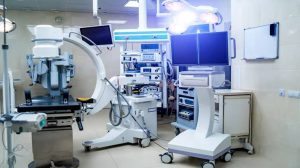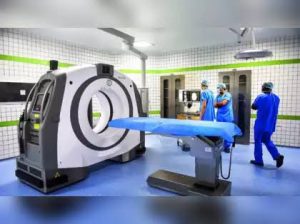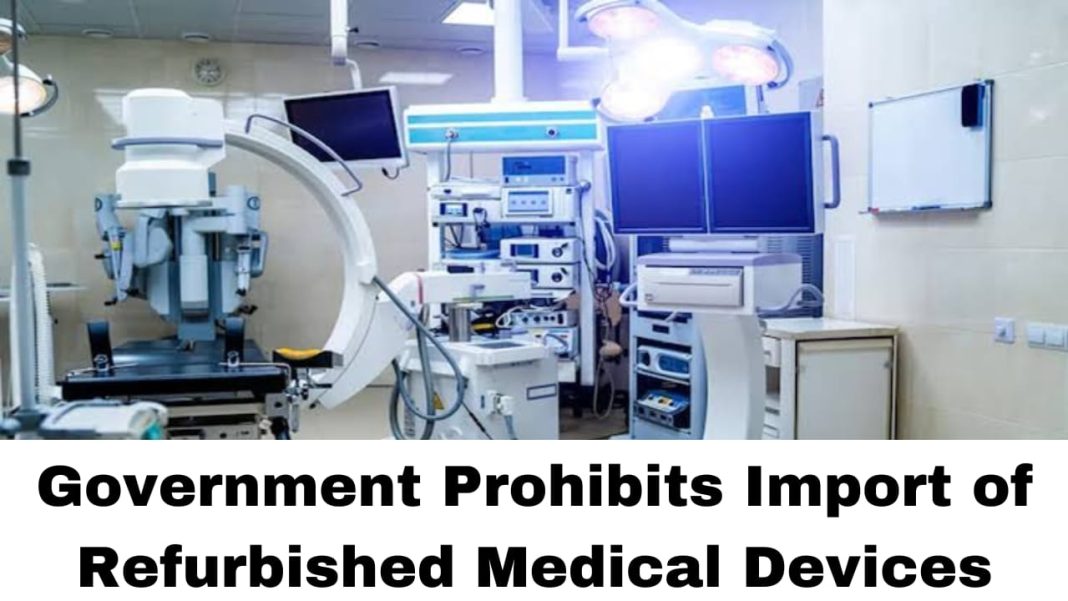Digital News Guru New Delhi Desk:
The Indian government has recently announced a prohibition on the import of second-hand or refurbished medical devices, citing concerns over patient safety and a lack of regulatory provisions. This decision marks a significant step towards protecting public health while supporting the domestic medical device manufacturing industry.
The Announcement and Its Basis
The Central Drugs Standard Control Organisation (CDSCO), India’s national regulatory authority for medical devices and pharmaceuticals, issued the directive in a letter dated January 10, 2025. The CDSCO stated that under the current Medical Devices Rules, 2017, there are no specific provisions to regulate the import, sale, or distribution of refurbished medical devices in India. Consequently, no licenses for such imports have been issued, effectively rendering them unauthorized.

This prohibition aligns with the Indian government’s broader goal of improving healthcare quality and safety standards while fostering local manufacturing capabilities. It also adheres to the National Medical Devices Policy 2023, which envisions India as a global hub for medical device production.
Industry Reactions
Dr. Jitendra Sharma, Managing Director of the Andhra Pradesh MedTech Zone (AMTZ), emphasized that banning refurbished medical devices is crucial for protecting the domestic market from the dumping of outdated or substandard equipment. He highlighted that patients should not have to rely on equipment with uncertain quality, which could compromise healthcare outcomes.
Challenges Highlighted by Stakeholders
While the ban has been welcomed by many, it has also raised concerns, especially from organizations like the Medical Technology Association of India (MTaI). According to MTaI, refurbished medical equipment accounts for nearly 10% of India’s medical device market. These devices play a critical role in addressing the healthcare needs of tier 2, tier 3, and rural areas, where access to new and expensive equipment remains limited.
MTaI pointed out that the sudden prohibition might disrupt healthcare services in underserved regions, as refurbished equipment has historically filled a gap by providing cost-effective solutions. They urged the Ministry of Health and Family Welfare to quickly develop a comprehensive policy framework to regulate refurbished medical devices, ensuring patient safety without creating barriers to access.

Balancing Safety and Accessibility
The government’s decision to ban the import of refurbished medical devices reflects its commitment to ensuring high standards in healthcare. Unregulated refurbished devices may pose serious risks, as their quality and safety cannot always be guaranteed. Malfunctioning medical equipment can lead to misdiagnoses or ineffective treatments, potentially endangering patients’ lives. By disallowing unregulated imports, the government aims to eliminate these risks and uphold public health.
At the same time, it is important to address concerns regarding access and affordability. New medical devices can be prohibitively expensive, particularly for smaller healthcare facilities in rural and semi-urban areas. A balanced policy framework that allows for the regulated import or local refurbishment of medical devices could ensure that cost-effective options remain available while maintaining safety standards.
Promoting Domestic Manufacturing
This prohibition also serves as an incentive for multinational and domestic companies to invest in local manufacturing. Under the National Medical Devices Policy 2023, the government aims to reduce dependence on imports and position India as a leader in medical device production. Encouraging local manufacturing not only boosts the economy but also ensures better quality control, job creation, and technological innovation within the country.
Looking Ahead
The ban on refurbished medical device imports marks a significant shift in India’s approach to healthcare and manufacturing. However, for the policy to be effective, it must be accompanied by robust efforts to develop a comprehensive regulatory framework for medical devices. Such a framework could include guidelines for the refurbishment of medical equipment within India, ensuring both safety and affordability.
Additionally, raising awareness among healthcare providers and the public about the risks associated with refurbished devices will be crucial. The government must also provide support to smaller healthcare facilities in transitioning to safer alternatives, possibly through subsidies or financing schemes.

Conclusion
The government’s decision to prohibit the import of refurbished medical devices is a bold and necessary step towards ensuring patient safety and fostering the growth of the domestic medical device industry. While the move addresses critical concerns about the quality of healthcare equipment, it also presents challenges that need to be tackled through thoughtful policymaking. By balancing safety, affordability, and accessibility, India can strengthen its healthcare infrastructure and position itself as a global leader in medical device manufacturing.
You May Also Read: Congress President Mallikarjun Kharge Accuses Centre of Hiding India’s Job Crisis








